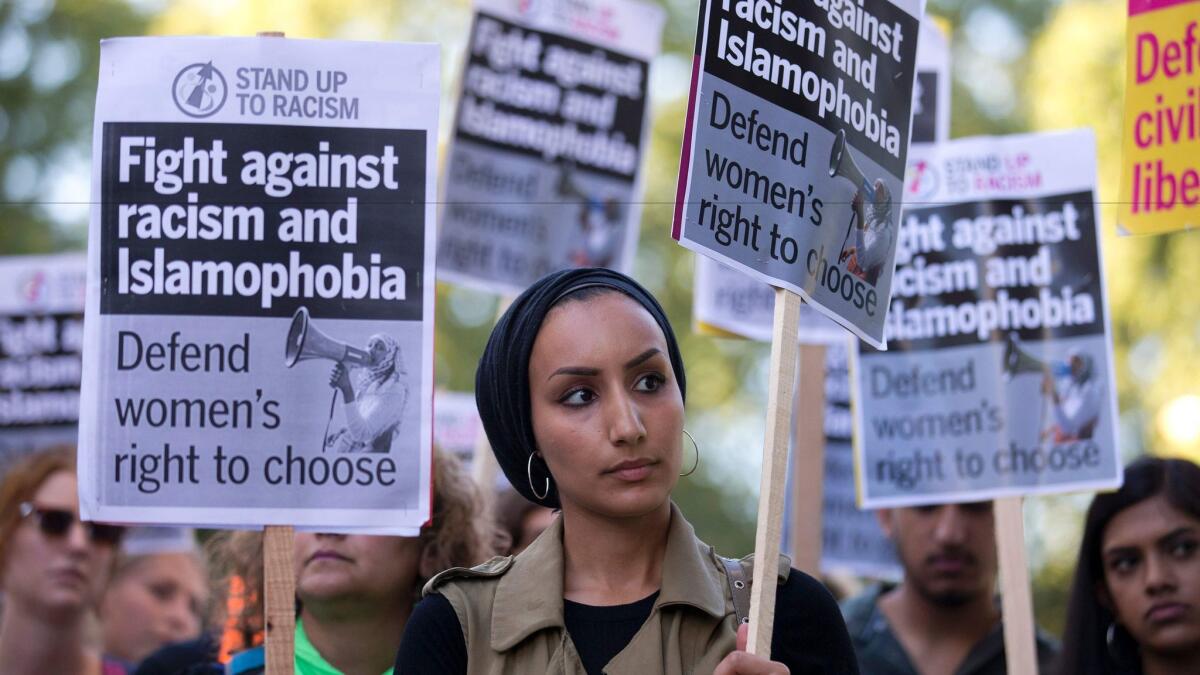The European Union’s Court of Justice rules that prohibiting hijabs in the workplace is not discriminatory

Across Europe, Muslim garb is a hot-button topic, and a court ruling on Tuesday — although nonbinding — is likely to turn up the heat.
The Court of Justice of the European Union, based in Luxembourg, said private employers can prohibit workplace displays of visible religious symbols such as the hijab, the head covering donned by some Muslim women. But the ruling left open the door for future complaints.
The court action comes at a time when the role of Islam in public life has been a driving force in public sentiment, and in electoral campaigns, across the continent. With anti-immigrant sentiment surging, the Netherlands holds parliamentary elections Wednesday, and key votes are set later this year in France and Germany.
Even though it is nonbinding, the European court ruling can be cited as a precedent, which gives it weight in ongoing culture wars.
France, for example, spent much of the summer embroiled in legal disputes over municipal public bans on the burkini, a body-concealing swimsuit.
And in Germany, Chancellor Angela Merkel has been on the defensive over her decision to permit the entry of 1 million migrants and asylum-seekers over the last two years. Merkel has for the first time endorsed her party’s call for a partial ban on the full-face veil known as the niqab.
Tuesday’s court ruling combined two cases brought by Muslim women who alleged discrimination by employers who refused to allow them to wear the hijab in the office.
While courts in France and Belgium will act on those particular cases, the European judges declared that in general, a workplace ban on visible expressions of political, philosophical or religious beliefs did not necessarily constitute discrimination.
In the cases jointly addressed in Tuesday’s ruling, the court suggested that without such a workplace policy already in place, Muslim women would have a stronger argument for demanding the right to wear headscarves if they wished.
In the French case, an employee named Asma Bougnaoui had worn the hijab from the outset when she was hired in 2008. But then a client complained, and she was told to take off her headscarf in the office of the IT firm where she worked, despite the fact that there was no existing internal rule governing it. She refused, and lost her job.
In its ruling, the court said customers’ expressed preference for dealing with an unveiled representative was not a “genuine and determining” reason for companies to go along with that wish and forbid the wearing of hijab.
The Belgian case centered on a female Muslim employee named Samira Achbita, who took a job with a multinational firm that already had an internal policy calling for “neutrality” in apparel. Achbita, a receptionist, did not begin wearing the hijab until three years after her hiring in 2003, according to court papers, and that led to her dismissal.
The court suggested that existing rules on workplace garb could protect a company from legal actions — something that could push some firms to preemptively set up such policies.
“An internal rule of an undertaking which prohibits the visible wearing of any political, philosophical or religious sign does not constitute direct discrimination,” the judges wrote.
The subject is highly fraught in both France and Belgium, both of which have been hit by large-scale terror attacks by assailants claiming Islamic extremism as their cause.
France, which has what is believed to be Europe’s largest Muslim community, has long adhered to the concept of laicite, generally defined as an absence of religious involvement in government affairs and state policy, and vice versa. Among Western European countries, France has moved most aggressively to regulate religious garb in public, including municipal efforts to ban the burkini, and restrictions on the niqab.
In France, the far-right National Front party has been gaining popularity, and its presidential candidate, Marine Le Pen, is expected to advance to a second and final round of voting in May. In Germany, Merkel’s Christian Democrats face challenges from both the left and the right in voting this fall.
The German party AFD, a populist group that takes a hard line on immigration, hailed the European court ruling, saying in a statement that it sends “the right signal, especially for Germany.”
Wednesday’s Dutch vote pits the stridently anti-immigration party of populist Geert Wilders against an array of other parties, including the center-right party that heads the current governing coalition. Wilders’ party is considered unlikely to win, but likely to gain in strength, giving it greater influence.
Twitter: @laurakinglat
ALSO:
Is that a swoosh on that hijab? Nike announces ‘Pro Hijab’ for Muslim women
Watch Muslim women explain what their hijab means to them
At the nation’s only Latino mosque, Trump’s immigration policies have ‘changed everything’
UPDATES:
1:35 p.m.: This article was updated throughout with Los Angeles Times reporting.
This article was originally published at 5:10 a.m.
More to Read
Sign up for Essential California
The most important California stories and recommendations in your inbox every morning.
You may occasionally receive promotional content from the Los Angeles Times.










